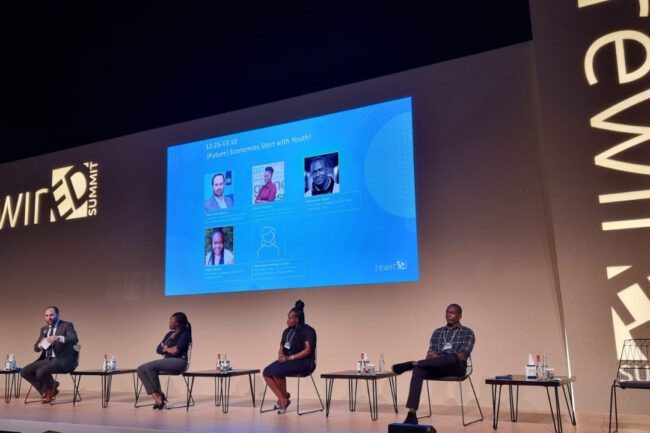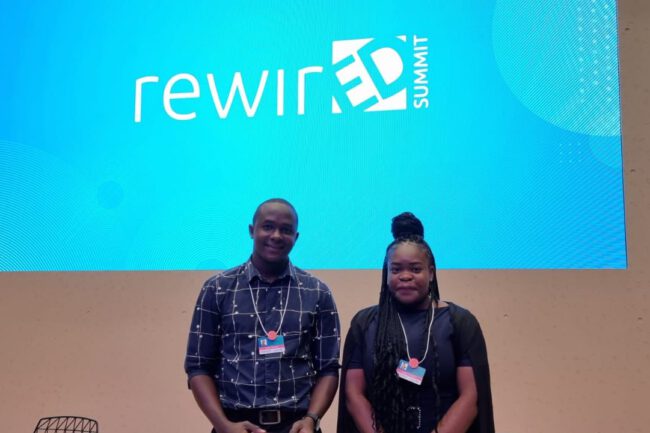CFYE joined the RewirEd Summit in Dubai to shape key discussions around education, skill-building, and youth employment. Led by Dubai Cares, in partnership with Expo 2020 Dubai, and in collaboration with the UAE Ministry of Foreign Affairs and International Cooperation (MoFAIC), the RewirEd Summit brought the global education community together to map out practical steps for a positive change in education. The summit held more than 100 sessions revolving around three main topics: Youth, Skills, and the Future of Work. We shared our vision for future work with a diverse group of youth, educational stakeholders, foundations, and international organizations representing more than 60 countries. We also reflected on the possible challenges that the future might introduce and how we can join efforts with different entities to pave the road to prosperous future economies – economies that start with youth.
Employment and education are inextricably linked. The skills we equip young people with can determine what job opportunities they will have access to and how well they can adapt to the needs of the employment market. Yet, the ever-changing job market brings many uncertainties about the future of work. Many sectors will undergo fundamental, often tech-enabled shifts, creating new positions, adjusting the existing ones, or making them redundant. In fact, some predict that 60% of children who are born now will have jobs that currently do not exist. But what will happen to the current jobs? What skills will be the most required? And most importantly, how can we prepare today’s youth for the jobs of tomorrow?
To brainstorm on these questions and explore what the future of work might have in store for the youth, two of our Youth Champs from Kenya, Mohamed Almas and Fridah Okomo, joined us to share their vision and lived experiences navigating employment issues. Moreover, we also had Brencil Kaimba, Product Strategy and Development Lead at Serianu (one of our implementing partners in Kenya), and the Dutch Ambassador of Youth, Education, and Work, Tijmen Rooseboom, as panel speakers.

Globalization 4.0: What can we expect?
The economy is changing. Digitalization does not only make space for new jobs, but it also impacts the nature of our work and the way we organize employment in the current landscape. Rapid innovations and digital technology create tighter knots between our labour activities across different economies. For instance, technological progress can manifest in the emergence of new sectors and more outsourcing activities in developing economies that require employees to have a myriad of new skills. If we want youth to lead these shifts and have access to the future workforce, we must take their aspirations and skills seriously; and that starts already in primary and secondary education. Tijmen emphasized the importance of building the right skills: “Young people need more sophisticated cognitive skills to take part in a changing society, such as critical thinking, problem-solving, creativity, and adopting a life-long learning mindset.” Fridah and Mohamed had similar visions on the skills of the future, highlighting entrepreneurial, technical, and resilience skills as prominent in making them confident in stepping into the (future’s) workforce.
However, matching youth’s skills and aspirations with the market requirements asks for the close collaboration of different entities with educational stakeholders. Specifically, the private sector can have a pivotal role in bridging the gap between education and work. Small and medium enterprises (SMEs) give an impetus to economic development and, therefore, have a leading role in shaping the work landscape. By closely partnering with educational institutions, they can provide work placements and become co-developers of school curricula that adequately prepare young people for working life. Only through this close cooperation between the public sector, private sector, civil society, and youth can we accomplish a future of work that is accessible, meaningful, and in line with the youth’s aspirations.
Youth as active agents of shaping their future
Creating a vision for future youth employment starts with collaborating with youth. This is precisely what Serianu strives to implement. Brencil deems involving the youth essential to creating jobs that center around the interests, skills, and ambitions of the youth in Kenya and abroad. Brencil shared how creating employment opportunities in Cybersecurity assumes many challenges, the biggest of which being young women’s involvement. Women make up a meager percentage of the IT professionals in Kenya as there are insufficient gender-sensitive initiatives to attract them into the IT sector. Having the right role models can enthuse young women into taking up jobs they haven’t considered before – just like it encouraged Brencil: “I became engaged in Cybersecurity because my university lecturer was a woman, and I got inspired by that.” Serianu implements this by actively recruiting female trainers.

Setting role models is only the first step to bridging the unemployment gap. Adopting a youth lens also means genuinely exploring young people’s interests and skills to map out roles that pursue a goal beyond getting them employed – jobs they can excel at. Putting young people in the lead of bringing about positive change resonated deeply with Mohamed and Fridah. Our Youth Champs embodied a collective voice of the Kenyan youth and their aspirations, pointing to the urgency of the youth’s need to access decent jobs. Fridah and Mohamed stressed that decent is a keyword here, as “the Kenyan youth aspire not only to acquire jobs but decent jobs; jobs that align with their ambitions, provide security, social protection, are inclusive, and provide personal and career development.” Kenyan youth have solid entrepreneurial aspirations, and given the necessary infrastructure and tools, they can realize these ambitions and design solutions that address the local challenges of their communities.
The session brought many engaging thoughts to the stage, laid out some practical steps we could already take to create a positive impact in youth employment, and invited some talking points that will undoubtedly resurface in our future conversations on meaningful work. However, one clear conclusion was present: youth are active co-creators of their future. If we imagine an accessible future of work furnished with decent working opportunities and driven by the skills and desires of the youth, we can’t continue “training tomorrow’s workforce for yesterday’s workplace.”
There are many roadblocks to realizing a sustainable future of work, but giving the driving seat to the youth will ensure we are working towards an economy that prioritizes a clear objective: the flourishing of young people in work and beyond.
You can watch CFYE’s Future Economies Start With Youth session at RewirEd here.